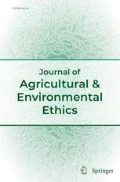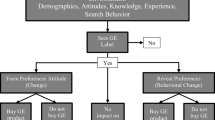Abstract
In this paper I argue that consumerautonomy does not count in favor of thelabeling of genetically modified foods (GMfoods) more than for the labeling of non-GMfoods. Further, reasonable considerationssupport the view that it is non-GM foods ratherthan GM foods that should be labeled.
Similar content being viewed by others
REFERENCES
Anonymous, Eurobarometer 52.1, The Europeans and Biotechnology, Report by INRA (Europ)-ECOS. Directorate-General for Research, Directorate B-Quality of Life and Management of Living Resources Programme (2000).
Chadwick, R., “Novel, Natural, Nutritious: Towards a Philosophy of Food,” Proceedings of Aristotelian Society 100(2) (2000), 193-208.
Dworkin, G., The Theory and Practice of Autonomy (Cambridge University Press 1988).
Dworkin, R., “What is Equality?” Part one and two, Philosophy and Public Affairs 10 (1981). European Commission, Directive 2001/18/EC (European Commission, 2001a).
European Commission, Proposal for a Regulation of the European Parliament and of the Council Concerning Traceability and Labeling of Genetically Modified Organisms and Traceability of Food and Feed Products Produced from Genetically Modified Organisms, IP/01/1095, 25 July (Brussels, 2001b).
Friends of the Earth Europe, “Traceability/Labeling and Novel Food/Feed,” FoEE Biotech Mailout 7(4) (2001).
Holtug, N., “Creating and Patenting New Life Forms,” in H. Kuhse and P. Singer (eds.), A Companion to Bioethics (Blackwell, 1998).
Jackson, D., “Labeling Products of Biotechnology: Toward Communication and Consent,” Journal of Agricultural and Environmental Ethics 12 (2000), 319-330.
Nottingham, S., Eat Your Genes: How Genetically Modified Food is Entering our Diet (Zed Books, 1998).
Politiken (Danish Newspaper), “Gensplejsning: Når der skal flyttes etiske bjerge (Gene-Splicing: Moving Ethical Mountains),” Politiken, Oktober 14th, 2001, pp. 6.
Thompson, P. B., Food Biotechnology in Ethical Perspective (Chapman and Hall, New York, 1997).
Thompson, P. B., “Risk, Consent and Public Debate: Some Preliminary Considerations for the Ethics of Food Safety,” International Journal of Food Science and Technology 36 (2001), 833-843.
Tænk + Test (Danish Consumer Magazine), No. 19, November 2001.
Zepeda, L., “Don't Ask, Don't Tell: U.S. Policy on Labeling of Genetically Engineered Foods,” Paper Presented at the American Association for the Advancement of Science. San Francisco, AC, February 18th, 2001.
Author information
Authors and Affiliations
Rights and permissions
About this article
Cite this article
Hansen, K. Does Autonomy Count in Favor of Labeling Genetically Modified Food?. Journal of Agricultural and Environmental Ethics 17, 67–76 (2004). https://doi.org/10.1023/B:JAGE.0000010845.31368.2f
Issue Date:
DOI: https://doi.org/10.1023/B:JAGE.0000010845.31368.2f



